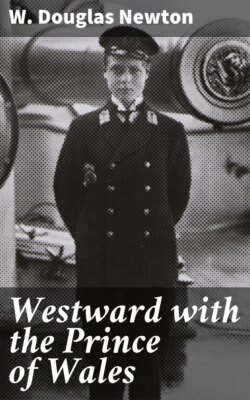Читать книгу Westward with the Prince of Wales - W. Douglas Newton - Страница 9
На сайте Литреса книга снята с продажи.
III
ОглавлениеDuring the day His Royal Highness went ashore informally, mainly to satisfy his craving for walking exercise. Before he did so, he received the British correspondents on board the Renown, and a few minutes were spent chatting with him in the charming and spacious suite of rooms that Navy magic had erected with such efficiency that one had to convince oneself that one really was on a battleship and not in a hotel de luxe.
We met a young man in a rather light grey lounge suit, whose boyish figure is thickening into the outlines of manhood. I have heard him described as frail; and a Canadian girl called him "a little bit of a feller" in my hearing. But one has only to note an excellent pair of shoulders and the strength of his long body to understand how he can put in a twenty-hour day of unresting strenuosity in running, riding, walking and dancing without turning a hair.
It is the neat, small features, the nose a little inclined to tilt, a soft and almost girlish fairness of complexion, and the smooth and remarkable gold hair that give him the suggestion of extreme boyishness—these things and his nervousness.
His nervousness is part of his naturalness and lack of poise. It showed itself then, and always, in characteristic gestures, a tugging at the tie, the smoothing-down of the hair with the flat of the hand, the furious digging of fists into pockets, a clutching at coat lapels, and a touch of hesitance before he speaks.
He comes at you with a sort of impulsive friendliness, his body hitched a little sideways by the nervous drag of a leg. His grip is a good one; he meets your eyes squarely in a long glance to which the darkness about his eyes adds intensity, as though he is getting your features into his memory for all time, in the resolve to keep you as a friend.
He speaks well, with an attractive manner and a clear enunciation that not even acute nervousness can slur or disorganize. He is, in fact, an excellent public speaker, never missing the value of a sentence, and managing his voice so well that even in the open air people are able to follow what he says at a distance that renders other speakers inaudible.
In private he is as clear, but more impulsive. He makes little darting interjections which seem part of a similar movement of hands, or the whole of the body, and he speaks with eagerness, as though he found most things jolly and worth while, and expects you do too. Obviously he finds zest in ordinary human things, and not a little humour, also, for there is more often than not a twinkle in his eyes that gives character to his friendly smile—that extraordinarily ready smile, which comes so spontaneously and delightfully, and which became a byword over the whole continent of the West.
It is this friendly and unstudied manner that wins him so much affection. It makes all feel immediately that he is extraordinarily human and extraordinarily responsive, and that there are no barriers or reticences in intercourse with him.
He is not an intellectual, and he certainly is not a dullard. He rather fills the average of the youth of modern times, with an extreme fondness for modern activities, which include golfing, running and walking; jazz music and jazz dancing (when the prettiness of partners is by no means a deterrent), sightseeing and the rest, and my own impression is, that he is much more at home in the midst of a hearty crowd—the more democratic the better—than in the most august of formal gatherings.
The latter, too, means speech-making, and he has, I fancy, a young man's loathing of making speeches. He makes them—on certain occasions he had to make them three times and more a day—and he makes good ones, but he would rather, I think, hold an open reception where Tom, Dick, Vera, Phyllis and Harry crowded about him in a democratic mob to shake his hand.
Yet though he does not like speech-making, he showed from the beginning that he meant to master the repugnant art. To read speeches, as he did in the early days of the tour, was not good enough. He schooled himself steadily to deliver them without manuscript, so that by the end of the trip he was able to deliver a long and important speech—such as that at Massey Hall, Toronto, on November 4—practically without referring to his notes.
During his day in Conception Bay, the Prince went ashore and spent some time amid the beautiful scenery of rocky, spruce-clad hills and valleys, where the forests and the many rocky streams give earnest of the fine sport in game and fish for which Newfoundland is famous.
The crews of the battleships went ashore, also, to the scattered little hamlet of Topsail, lured there, perhaps, by the legend that Topsail is called the Brighton of Newfoundland. It is certainly a pretty place, with its brightly painted, deep-porched wooden houses set amid the trees in that rugged country, but the inhabitants were led astray by local pride when they dragged in Brighton. The local "Old Ship" is the grocer's, who also happened to be the Selfridge's of the hamlet, and his good red wine or brown ale, or whatever is yours, is Root Beer!
For many of the battleships' crews it was the first impact with the Country of the Dry, and the shock was profound.
"I was ashore five hours, waiting for the blinkin' liberty boat to come and take me off," said one seaman, in disgust. "Five hours! And all I had was a water—and that was warm."
